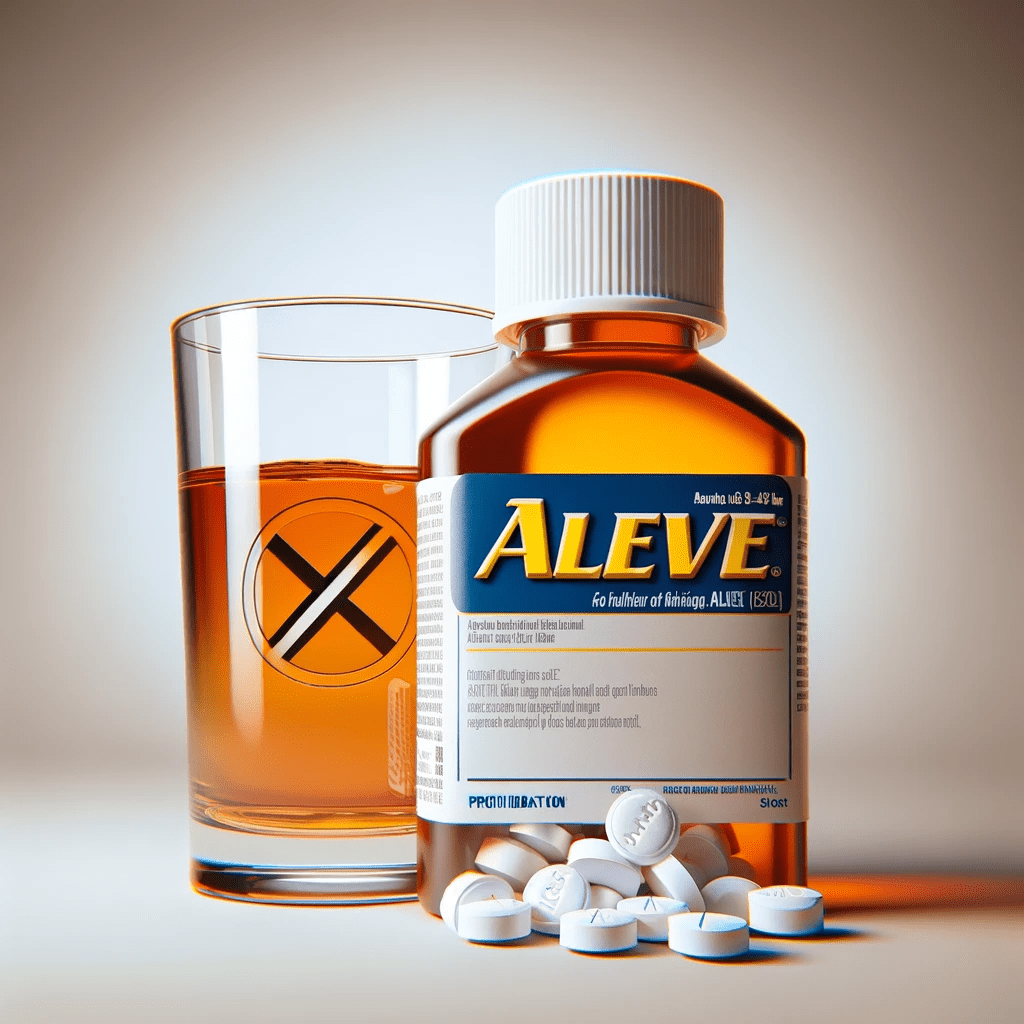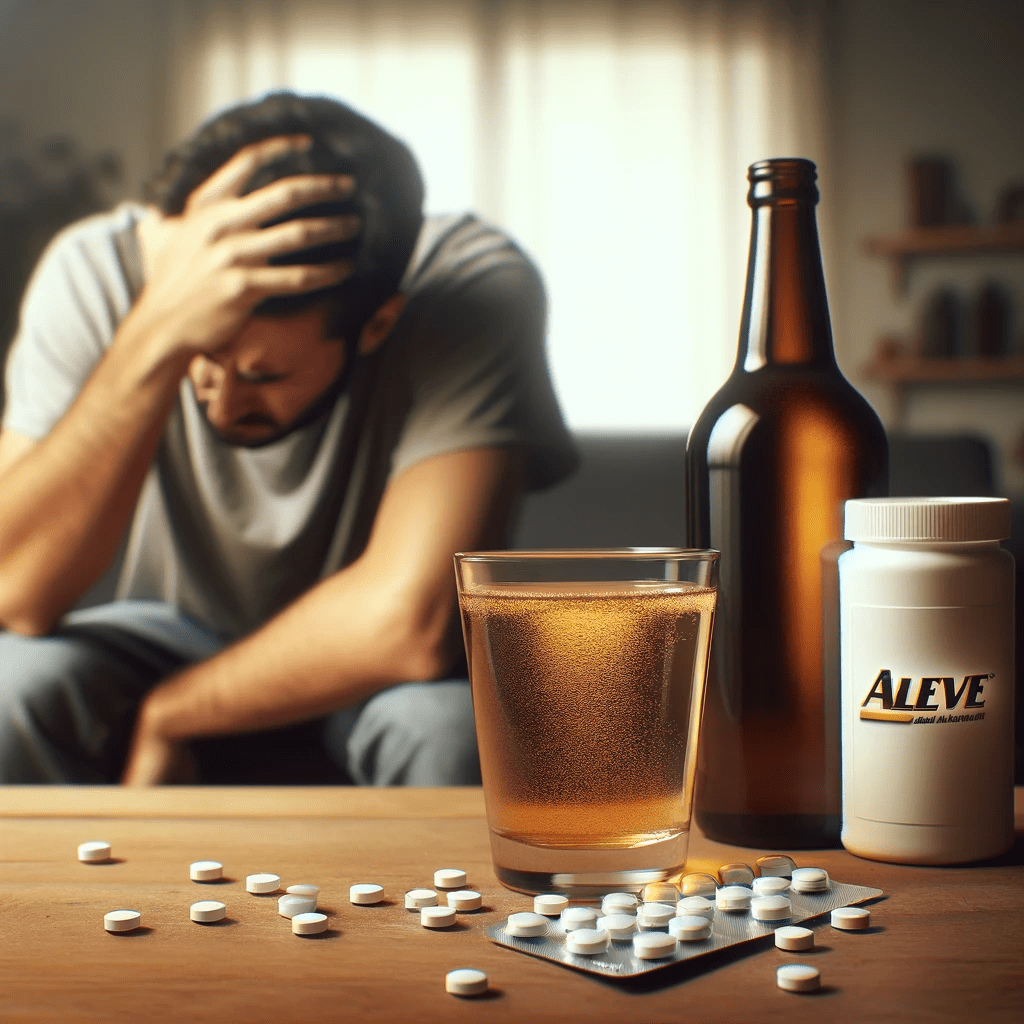Why You Shouldn’t Mix Aleve and Alcohol: Effects and Health Risks

- Aleve inhibits the synthesis of prostaglandins, which can affect inflammation and pain.
- Alcohol is a harmful toxin with central nervous system (CNS) depressant effects.
- Aleve and Alcohol together can intensify toxicity and lead to uncomfortable effects and health risks.
- Treatment for alcohol abuse or polysubstance use can help restore the balance in your body and life.
Aleve is a pain reliever that can be obtained over the counter and as a prescription. Alcohol is often consumed in an attempt to mask physical or emotional discomfort. Together, they pose a dangerous health risk that can lead to concerning effects.
Can You Take Aleve and Alcohol Together?
No, it is not recommended to take Aleve and alcohol together, though pain is a powerful motivator. Humans have invented creative ways for thousands of years to alleviate pain.
Alcohol has been used as a pain reliever throughout history. [1] Aleve is a brand name of Naproxen, an NSAID pain reliever invented in 1976 that has more than 10 million prescriptions filled every year.[2] Aleve is generally considered safe if consumed in the recommended dosages.
It may be tempting to think that combining the benefits of alcohol with the pharmaceutical modernity of Aleve will multiply the positive effects of pain alleviation without overdosing on either one. However, Aleve and alcohol are both substances that have a direct effect on your internal organs, such as increasing the risk of gastrointestinal bleeding and ulcers. Taking them together will intensify their effects in a harmful way and potentially lead to other disorders such as Alcohol Use Disorder.
Aleve Drug Facts
Aleve belongs to a class of medications called non-steroidal anti-inflammatory drugs (NSAIDs). It’s an over-the-counter medication, similar to ibuprofen, which means you don’t need a prescription to get it, depending on the dose. Basically, it’s meant to help decrease the amount of pain you are experiencing.
The active ingredient in Aleve is naproxen sodium. It temporarily blocks the production of naturally occurring hormone-like substances called “prostaglandins,” which play a direct role in pain.[3]
Prostaglandins cause inflammation, pain, and fever in many inflammatory processes.[4] They contribute to the pain during the healing process. Aleve inhibits the synthesis of prostaglandins, particularly prostaglandin production.
Aleve Side Effects
When prostaglandin production is inhibited in the body, its protective functions in certain organs, including the stomach, are affected. Among other things, prostaglandins are responsible for preserving the inner lining of the stomach (gastric mucosa).
“Prostaglandins inhibit acid secretion, stimulate mucus secretion, alter mucosal blood flow, and provide dramatic protection against a wide variety of agents which cause acute mucosal damage.”[5]
Bayer, the company that produces Aleve, does not recommend taking Aleve for more than 10 days for pain and 3 days for fever.[6] Overdosing on Aleve can reduce the levels of prostaglandins necessary to preserve the inner lining of your stomach, which can lead to both acute and chronic gastritis.[7]
Gastritis is the precursor to stomach ulcers. Overdosing does not lead to spontaneous ulceration, but repeated damage to the gastric mucosa can lead to ulceration further down the road.
Alcohol Facts
Alcohol fermentation is a biological process wherein yeasts convert sugar or starch into alcohol (also called ethanol). It is certainly available “over-the-counter,” and you don’t need a prescription to get it. The active ingredient in alcohol is ethanol (ethyl alcohol).
Alcohol has been scientifically shown to reduce the sensation of pain in both animals and humans. Moderate drinking is associated with less pain in patients with chronic pain and fibromyalgia.[8] This isn’t because alcohol blocks prostaglandin production. Rather, alcohol depresses the central nervous system.[9] It scrambles the body’s electronic signals, so the pain signals aren’t interpreted as sharply.
A standard drink of alcohol is 14 grams. To remain safe, the CDC recommends that adult men have no more than 2 drinks per day and adult women have no more than 1 drink per day.[10]
Alcohol Side Effects
There is a mountain of evidence that even moderate alcohol use can have long-lasting health repercussions. Alcohol is a toxin your body must get rid of.[11] Besides being proveably hazardous to the brain, heart, liver, and pancreas, the effect of alcohol on the gastrointestinal system has also been well-established.
Alcohol consumption can also stimulate the stomach to increase acid production. This increase in acid production can irritate and damage the gastric mucosa, the protective lining of the stomach. Over time, repeated exposure to high acid levels can wear down the gastric mucosa, making it more susceptible to injury and ulcers. [12]
Common Side Effects of Combining Aleve and Alcohol
The active ingredient in Aleve (naproxen sodium) inhibits the body’s synthesis of prostaglandin, which increases the risks of gastritis and stomach ulcers. The active ingredient in alcohol (ethyl alcohol) causes many problems for the stomach., such as stomach ulcers, stomach bleeding, gastritis, damage to the stomach lining, heartburn, upset stomach, and abdominal pain.
When Aleve and alcohol are combined, the results can be damaging.
Since Aleve inhibits certain prostaglandins, it affects the protective mechanisms of the stomach lining. Adding alcohol to this, which is harmful to the gastric mucosa, can compound this effect, as the stomach’s natural defenses are compromised.
The combination of Aleve and alcohol can stress the stomach, increasing its acidity. With the protective prostaglandins diminished, the stomach lining becomes more vulnerable to damage. Prolonged exposure to these conditions can lead to the formation of open sores in the stomach, known as gastric ulcers.
The Long-Term Effects of Mixing Naproxen and Alcohol
There are serious long-term side effects to mixing Aleve and alcohol. Exceeding the recommended dosage of Aleve for more than 10 days, especially while consuming alcohol, can lead to severe health risks, including decreased kidney function, liver damage, and gastrointestinal cancer.
These include decreased kidney function, liver damage, heart attack, and even gastrointestinal cancer. Chronic gastric ulcers, especially those associated with Helicobacter pylori infection, can increase the risk of developing stomach cancer.[13]
Choose Wellness and Recovery
Mixing alcohol with medications like Aleve can increase physical harm and lead to dangerous polysubstance use habits. Choose wellness and recovery.
Frequently Asked Questions About Mixing Aleve and Alcohol

